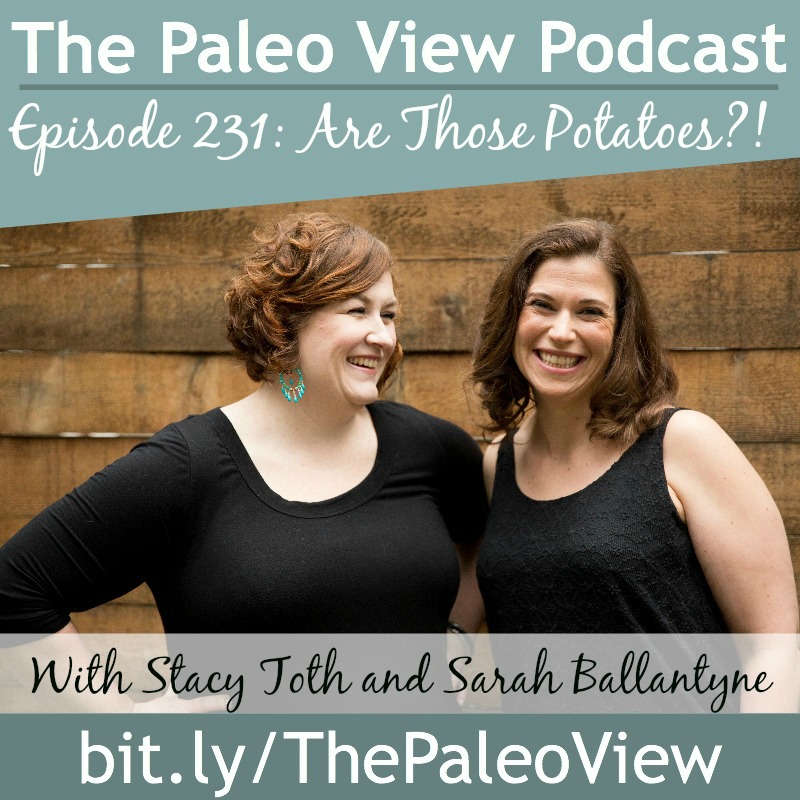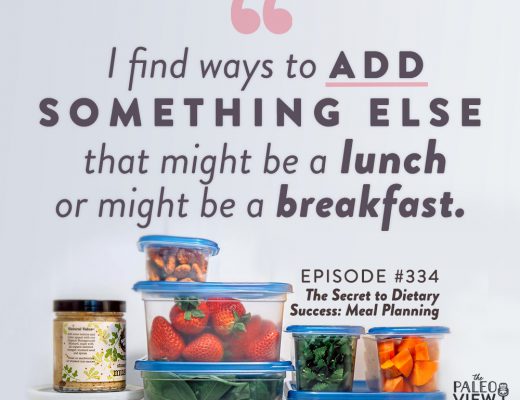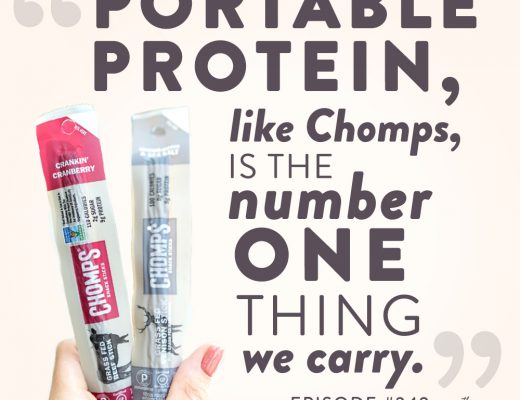Ep. 231: Are Those Potatoes?!
In this episode, Sarah and Stacy discuss the pros and cons of eating the dreaded potato!
Click the picture above to be taken to iTunes
or download and listen by clicking the PodBean Player below
![]()
If you enjoy the show, please review it in iTunes!
The Paleo View (TPV), Episode 231: Are Those Potatoes?!
- Intro (0:00)
- News and Views (0:40)
- Stacy caught her first Ditto! So exciting
- Sarah has so many Dittos, though.
- Stacy is in California this week on vacation. We’re recording ahead of time.
- Sarah is that person you know who’s almost completed a Pokemon Go Pokedex.
- This week’s episode is all about potatoes! Those most reviled of starchy carbs!
- Potatoes! (6:58)
- Potatoes are a very contentious topic in paleo!
- Chris Kresser approved of potatoes back in late 2010 thanks to research by Stephan Guyenet
- The Whole30 approved of potatoes in July of 2014
- People who come from a low carb perspective, particularly those who come from Loren Cordain, tend to be angry about the inclusion of potatoes in paleo.
- In Paleo Principles, Sarah is breaking down foods into “Paleo Yes”, “Paleo No” and “Paleo Maybe”
- Potatoes have been demonized as being “pure sugar” or the same as white bread
- Sarah says to find what you absolutely need to do the rest of the diet. If it’s whipped cream, do it.
- Stacy loves her iSi Easy Whip
- Potatoes aren’t empty. They have nutrition similar to other root vegetables.
- Potatoes have potassium, Vitamin C, Vitamin B6, Manganese, Magnesium, Vitamin B3, Vitamin B9, Phosphorous, Iron, and Copper plus a bunch of other trace minerals.
- Yes they have a high glycemic index, but you can lower it with other foods, such as with fat (butter on your potato perhaps)?
- Also, cooking and cooling will also break down the starches and lower glycemic response.
- You can lower it by about half with these tricks.
- Potatoes are nightshades and contain glycoalkaloids (these are the poisons which make nightshades a problem), which is why they aren’t in the Autoimmune Protocol. But some varieties are higher in them than others
- Potatoes and other “potatoes” come from completely different groups. They’re both tubers and look similar, but they’re not nearly as related as, say, broccoli and Brussels sprouts
- Potatoes are much more closely related to tomatoes, peppers, and tobacco than either sweet potatoes or yams
- Glycoalkaloids are a saponin, which is a chemical that helps mix oil and water.
- They are toxic, and super high amounts (3-6 mg per kg of body weight) could kill you. Half of that is a toxic dose.
- Don’t eat green potatoes, those have higher amounts of glycoalkaloids. But a super super large amount of ripe potatoes could be toxic too.
- Eat a variety of root veggies! Not only potatoes are tasty!
- Some scientists believe that all these potatoes in the diet are a cause of all the chronic illnesses lately. It’s probably more complicated, but an interesting thought.
- Glycoalkoloids damage the gut, enter the bloodstream and cause inflammation.
- Potatoes are tested for safety. The limit is 20 mg glycoalkaloids per 100 g of potato (one small potato).
- You’d have to eat about 50 pounds of Russets to get a fatal dose
- Lenape potatoes are very high in toxic chemicals, and have been known to make people sick easily.
- Other foreign cultivars have thousands of times more toxic chemicals than American grocery store varieties.
- Most of the glycoalkaloids are in the peel and just below the peel, so peeling will safeguard you from it.
- Microwaving actually works better at getting rid of the toxicity than other cooking methods. (Microwaves are cool. See this podcast and this post.)
- There are reasons to eat them, and reasons not to. But don’t lump them in with white sugar or anything because they are different!
- See Sarah’s post on potatoes, including a chart of potato cultivars and their toxicity!
- People doing introductions from Autoimmune often find that potatoes are okay since peeling gets rid of most of the toxicity
- A lot of different things go into whether a particular food is right for you or not. And some “paleo foods” might not work for you.
- Don’t get caught up in the lists and the rules and figure out what actually helps you to be healthy and what doesn’t.
- It’s a good idea to peel potatoes, but if you’re not getting ill from them, definitely eat them for their nutritional content!
- Replacement starches: green plantain, white or purple sweet potatoes, parsnips, boniata root (Thanks Russ!), squash, cassava, taro root, lotus, turnips, rutabaga
- Mix up your root veggies! If you eat seasonally, you’ll always be rotating what you eat!
- Outro (50:49)





